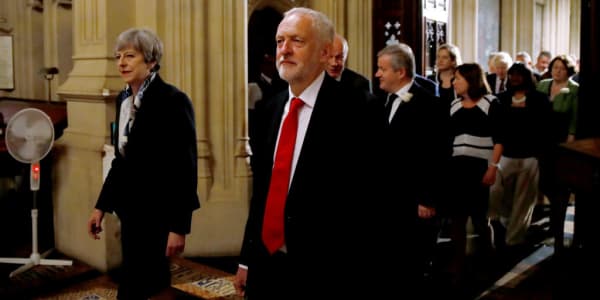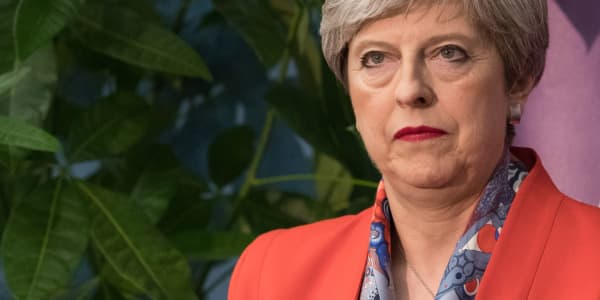U.K. lawmakers have voted overwhelmingly in favor of Prime Minister Theresa May's proposals to hold a snap general election on June 8.
With the vote just weeks away, CNBC takes a look at the leading candidates and how they propose to win British support.
Theresa May, Conservatives
Current Prime Minister Theresa May hopes her plans for a "strong and stable" post-Brexit Britain will prove popular with voters, which, in turn, will give her a stronger majority in parliament.
The Conservatives currently hold 330 of a total 650 parliamentary seats. May claims this has small 17 seat majority has made it difficult to push ahead with EU negotiations.
May enjoyed a head start in campaigning following her surprise election announcement in April, and was quick to place her Brexit strategy front and center of her campaign. This includes a pledge to end European Union free movement of people into Britain - while guaranteeing workers rights for existing EU workers - and a departure from the EU single market and customs union.
However, she has reaffirmed to the EU's chief Brexit negotiator Michael Barnier and European Commission President Jean-Claude Juncker that she hopes to have a "deep and special partnership" with the union after Britain has exited.
Within the U.K., the party has promised to improve workers' rights. This includes increasing the national living wage in line with earnings until the end of
The Conservatives have also pledged to secure more funding for mental health care, a cap on gas and electricity bills and a "new generation" of social housing.
Despite the party's spending proposals, May has maintained that the Conservatives will remain the "lower tax party" - though it has stepped back from plans to clear the deficit by the end of parliament due to Brexit costs.
Elsewhere, the party has attempted to woo younger voters with a policy which would allow them to erase social media messages posted before the age of 18.
Jeremy Corbyn, Labour
He will have a fight on his hands, however, to convince both dissidents within the Labour party and members of the public that he has the skills required to lead the government. Currently, the party holds 229 seats in the House of Commons, having suffered a painful defeat in the 2015 general election.
However, Corbyn has vowed to "overturn the rigged system" and return power from the establishment to the hands of the British people.
Like the Conservatives, Labour has pledged to enact the British democratic will and follow through with Brexit negotiations. But the party insists that its policies will extend far beyond this to focus on increased public spending and
"Theresa May will try to say that this is an election about Brexit while ignoring her government's failure and the issues that affect people's lives every day," Corbyn said, speaking in central London on his first day of campaigning.
The party, in its manifesto, has laid out aims to build a new "partnership" with the EU, including guaranteeing the existing rights of EU nationals and retaining benefits of the single market and customs union. Unlike the Conservatives, Labour has not made a commitment to reduce immigration numbers.
Elsewhere, Britain's national health service (NHS), which has long been central to Labour policies, will be one of
He also intends to re-nationalize several public services, including water, railways and the Royal Mail.
Corbyn has proposed a £48.6 billion ($62.61 billion) tax plan to pay for his spending plan. This includes lowering the 45p tax threshold to all workers earning over £80,000, rather than £150,000. He also intends to introduce a new 50p tax for all those earning over £123,000 and raising corporation tax by more than a third to 26 percent by 2022.
The prime ministerial hopeful also seeks to win favor among the devolved governments of England, Ireland, Scotland and Wales by promising four additional bank holidays on each nation's patron saint day to "celebrate the national cultures of our proud nations." The pledge may well appeal to voters, not least because of the extra leave from work but also due to growing nationalist sentiment.
Tim Farron, Liberal Democrats
Tim Farron is
Already the party has said that it will offer a second referendum on the final Brexit deal and has seen a recent surge in membership and funding following May's election announcement. In the early days of campaigning, the Lib Dems doubled their party membership and received more than £1.6 million ($2.04 million) in donations.
The party suffered a fall from grace under a 2010 coalition with the Conservatives, however, and they will face an uphill battle to increase their current nine seats.
Aside from a second referendum, Farron has pledged to reverse May's planned hard Brexit and fight to retain Britain's membership of the single market and open border policy.
"The public will have a very clear choice," Farron wrote in The Independent the day of the election announcement. "If it wants to keep Britain in the single market, and keep a Britain that is open, tolerant and united, this is its chance."
Like Labour, the Lib Dems will also seek to redistribute wealth by increasing taxes
The party also plans to back business by introducing a new £100-a-week allowance for budding entrepreneurs for up to six months.
Senior Lib Dem party members ruled out a potential post-election coalition with Labour in April, arguing that a partnership with Corbyn would be "toxic".
However, more recently the party announced that it would not field a candidate in the Brighton Pavilion constituency, a seat currently held by Green party co-leader Caroline Lucas, as part of a "constructive collaboration" to challenge May's lead.
Nicola Sturgeon, Scottish National Party
She has also strongly criticized May for undermining British democracy and reducing parliamentary accountability under new plans to increase the Conservative majority.
"A virtual one-party Tory state is a horrifying prospect," Sturgeon wrote in the Scotsman newspaper shortly after the election announcement. "That simply isn't acceptable in a democracy."
The SNP currently hold 54 seats in the House of Commons, having achieved major gains which secured all but three Scottish constituencies in the 2015 election.
A similar success is likely to further fuel Sturgeon's fight for a second referendum, while losses to pro-U.K. parties will significantly undermine the independence party's plight.
Nevertheless, the Scottish leader has said that her race to secure votes on June 8 would be uncorrelated to any second independence vote.
Caroline Lucas and Jonathan Bartley, Green Party
The Green party currently holds just one seat in parliament but hopes to capitalize on uncertainty and political disillusion to increase its standing.
Co-leaders Caroline Lucas and Jonathan Bartley called for talks with Corbyn and Farron in the hope of founding a centre-left "progressive alliance" to compete with the Conservatives' stronghold.
As well as campaigning for continued collaboration with Europe, the party has positioned itself in stark contrast to the Conservatives, with plans to push for "a bold alternative to cuts and austerity."
It aims to maintain Britain's membership of the EU's single market and uphold free movement of people across the union in its vision of a "multicultural, welcoming Britain."
The party also seeks to win youth votes and has instigated calls to extend June's vote to 16 and 17-year-olds. Currently, only those aged 18 and over are eligible to vote in U.K. general elections.
Paul Nuttall, UKIP
The U.K. Independence Party's progress in the election will be interesting. Having
The party has already decided not to field candidates in just under half of all constituencies, meaning that would-be right-wing voters may opt for a Conservative alternative.
Former leader Nigel Farage, who was instrumental in the U.K.'s leave campaign last year, has also said that he will not stand in this year's race but stated that current leader Paul Nuttall has "six weeks to prove himself".
Nuttall has so far touted plans for an "integration agenda" promoting "British law and a British way of life." This includes proposals to ban Sharia law, the principles underpinning Islam, and full face veils.
Deputy leader Peter Whittle has claimed that the burqa, a religious body garment, is a "deliberate barrier" to integration and should be forbidden in public places.
The party has also announced a pledge to close any Islamic state schools suspected of teaching Islamist ideology.





